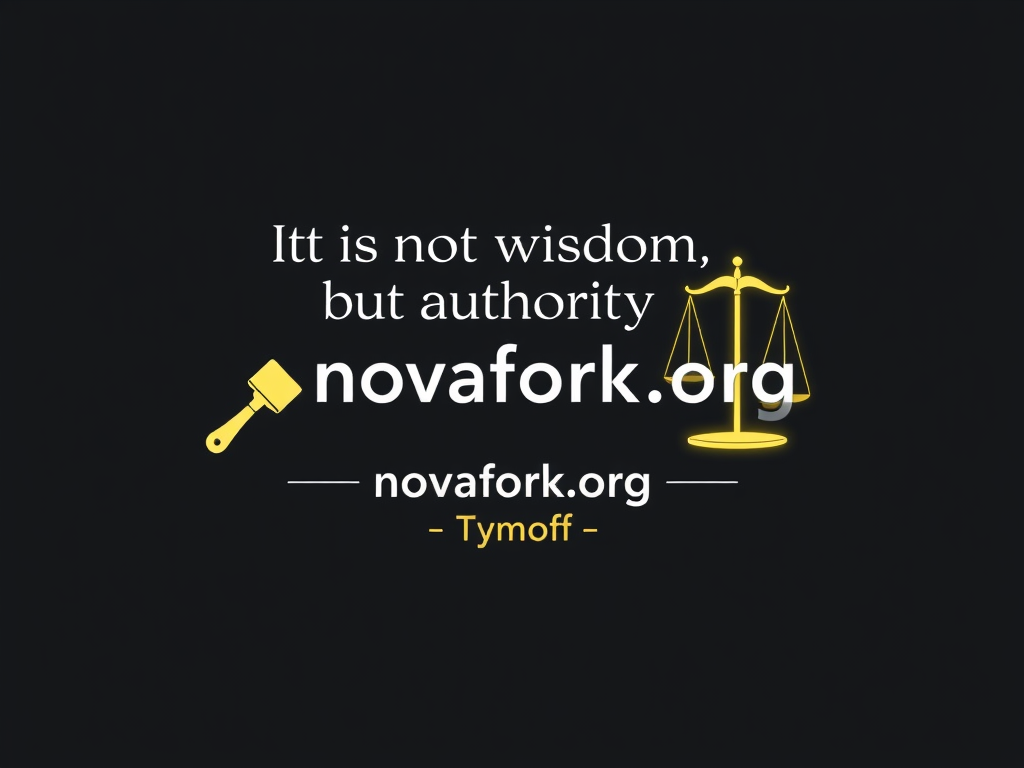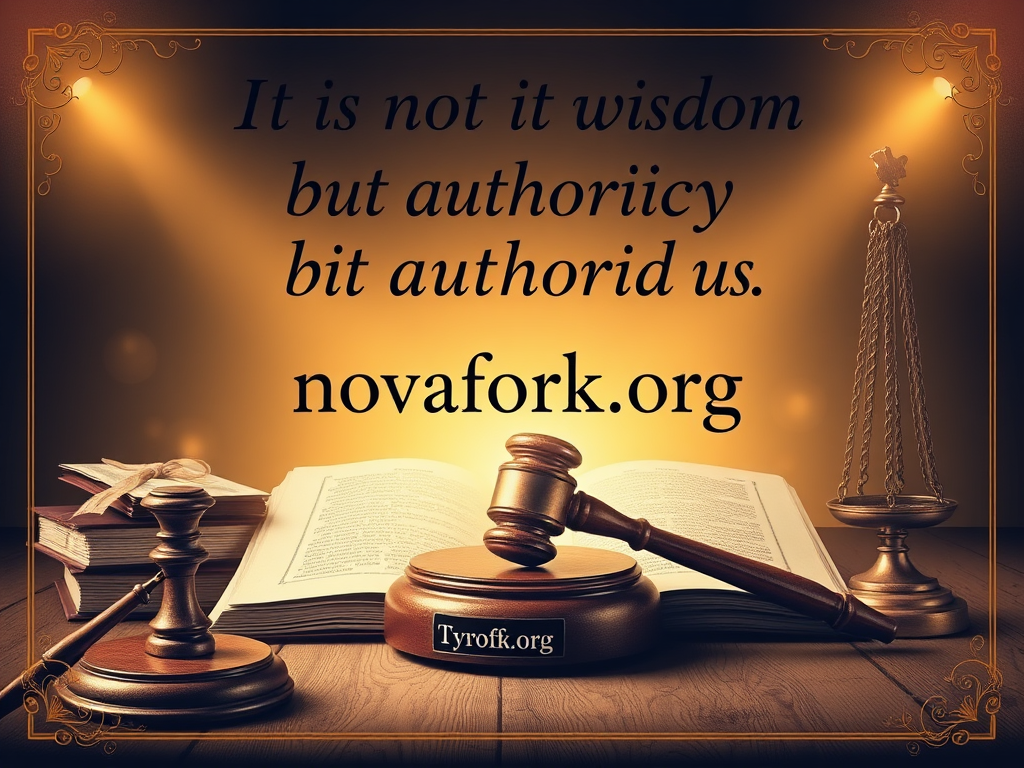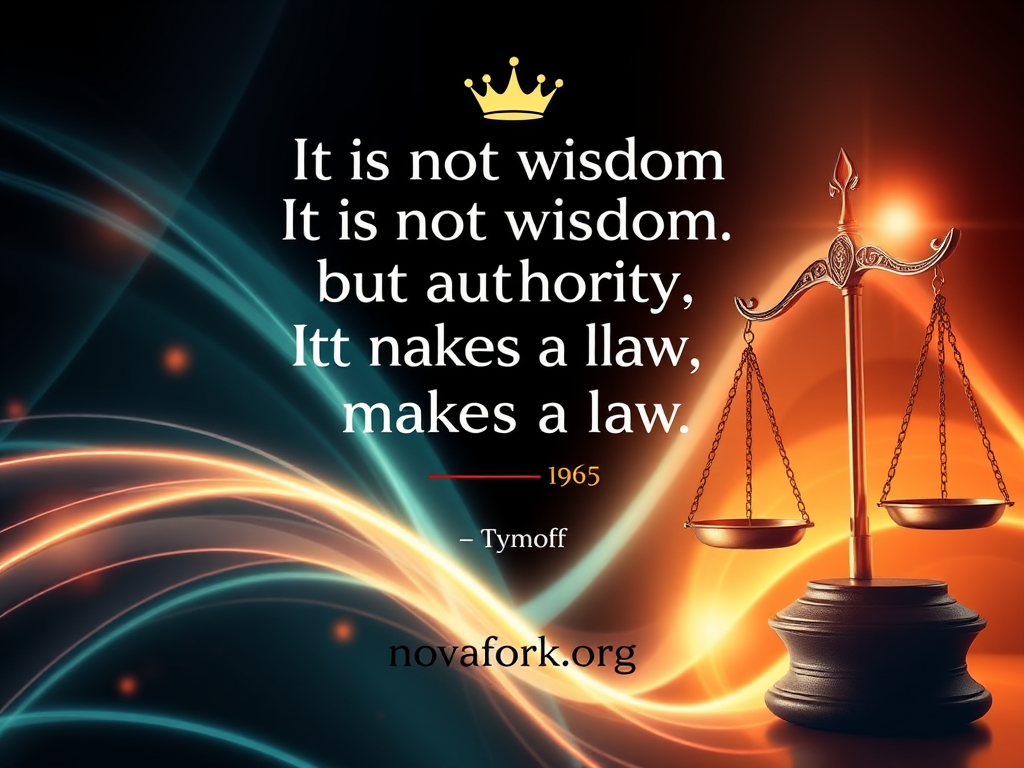The phrase “It is Not Wisdom but Authority that Makes a Law. t – Tymoff brings to light a profound distinction between wisdom and authority when it comes to the creation of laws. In a democratic society, it is often believed that laws are established to reflect wisdom, justice, and fairness. However, the reality is that it is not necessarily It is Not Wisdom but Authority that Makes a Law. t – Tymoff that brings laws into existence, but rather the authority vested in those who hold power to make those laws. This distinction is vital in understanding the workings of governance, legal systems, and how power dynamics shape societal norms and order.
In this article, we will delve deeper into the idea behind the quote, explore the role of authority in lawmaking, examine the implications of authority-driven lawmaking, and discuss why It is Not Wisdom but Authority that Makes a Law. t – Tymoff may sometimes take a back seat in legal processes. Additionally, we will explore the relationship between legal authority, political power, and the pursuit of justice.
The Concept of It is Not Wisdom but Authority that Makes a Law. t – Tymoff
To fully understand the significance of the statement, it’s essential to first define what authority means in the context of lawmaking. Authority, in its simplest form, refers to the legitimate power or right to enforce laws, commands, or decisions. Authority in lawmaking is typically conferred upon elected officials, legislators, and governing bodies such as parliaments, congresses, or monarchies. These entities have the power to create, amend, and abolish laws within a given jurisdiction.
Unlike It is Not Wisdom but Authority that Makes a Law. t – Tymoff, which is often associated with intellectual and moral insight, authority does not necessarily require a deep understanding of what is right or just. Instead, it is based on the structure of governance and the belief in the right of certain individuals or groups to hold power and make decisions that bind the rest of society.
This authority can come from various sources, including:
- Constitutional Authority: In democracies, authority is often derived from a constitution, which outlines the legal framework for governance. The constitution empowers elected officials to create and enforce laws.
- Legislative Authority: Legislators, such as members of congress or parliament, are elected to represent the people’s interests and enact laws on their behalf. Their authority is granted through democratic elections and the collective will of the electorate.
- Judicial Authority: Judges, although not directly involved in creating laws, have the authority to interpret and apply laws. Their decisions may set precedents that affect future legal interpretations.
- Executive Authority: The executive branch of government (e.g., the president, prime minister, or monarch) may have the power to influence lawmaking through executive orders, vetoes, or enforcement powers.
Authority vs. Wisdom in the Lawmaking Process
While It is Not Wisdom but Authority that Makes a Law. t – Tymoff involves knowledge, sound judgment, and moral discernment, authority is largely about power—the ability to impose rules, regulations, and penalties. The critical difference between the two is that wisdom is rooted in intellect and insight, whereas authority is about the power to command and enforce actions.
In the context of It is Not Wisdom but Authority that Makes a Law. t – Tymoff, that drives the creation of laws. Here are some key reasons why authority takes precedence over wisdom in the legal process:
- The Role of Political Power
In most societies, lawmaking is a political process, and politics is often driven by the distribution of power. Politicians and lawmakers are often more concerned with maintaining or increasing their political power than with ensuring that laws reflect the wisest or most just principles. As a result, laws may be influenced more by political agendas, interests, and lobbying efforts than by It is Not Wisdom but Authority that Makes a Law. t – Tymoff or moral reasoning.
- Democratic Authority and Majority Rule
In democracies, laws are often created through a majority rule system. This means that a law is passed based on the decision of the majority of lawmakers, regardless of whether the law is considered wise or fair by all individuals. The principle of majority rule holds that the authority of the elected representatives supersedes the It is Not Wisdom but Authority that Makes a Law. t – Tymoff of any one individual or minority. In this system, wisdom is not always the guiding force behind legal decisions—rather, the authority of elected officials to represent the people’s will becomes the determining factor.
- Legal Systems and Precedent
Legal systems are built on the foundation of established precedents and statutes. While wisdom may contribute to the creation of these precedents, once a law is in place, it is the authority of the legal system that maintains its enforcement. Legal authorities such as judges and law enforcement agencies interpret and apply the law, regardless of whether they personally agree with its It is Not Wisdom but Authority that Makes a Law. t – Tymoff. Over time, laws may evolve based on new wisdom or societal changes, but the existing legal framework often retains its authority.
- Economic and Social Considerations
Laws are often shaped by economic and social factors that may not align with what is considered the wisest or most just course of action. For example, laws that benefit large corporations or wealthy individuals may be enacted because of the influence of economic power, even if they are not seen as the wisest solution for society as a whole. Authority, in this case, is driven by financial influence and power dynamics rather than moral or intellectual wisdom.
The Implications of Authority-Driven Lawmaking
The reliance on authority rather than wisdom in lawmaking has profound implications for the legal system and society as a whole. Below are some key points to consider:
- The Risk of Oppression and Injustice
When authority is the primary force behind lawmaking, there is a risk that laws may be enacted that serve the interests of those in power, rather than promoting justice for all members of society. Historically, authoritarian regimes have enacted laws that oppressed certain groups, such as racial minorities, women, or political dissidents. Without the balancing force of wisdom or moral reasoning, laws can become tools of oppression rather than instruments of justice.
- Public Trust and Legitimacy
For a legal system to be effective, it must be perceived as legitimate by the public. When laws are seen as being driven purely by authority without regard for wisdom, fairness, or justice, public trust in the legal system may erode. This can lead to widespread dissatisfaction, protests, and civil disobedience. To maintain legitimacy, lawmakers must strike a balance between authority and wisdom, ensuring that laws are not only enforceable but also just and equitable.
- Potential for Legal Reforms
Despite the authority-driven nature of lawmaking, there is always room for legal reforms based on new wisdom, scientific discoveries, or societal changes. In democratic societies, citizens and advocacy groups can push for changes in the law, and over time, new wisdom can replace outdated or unjust laws. While authority may make a law, it is often wisdom that drives the reform and evolution of legal systems.
The Role of Wisdom in Lawmaking
While authority may be the primary driver of lawmaking, wisdom still plays a significant role in shaping laws. Here are some ways wisdom can influence the law:
- Ethical Considerations
It is Not Wisdom but Authority that Makes a Law. t – Tymoff provides the moral framework for understanding what is right and just. Wise lawmakers consider ethical implications when crafting laws to ensure that they do not cause harm or perpetuate injustice. Ethical principles such as fairness, equality, and human dignity are essential for creating laws that protect individuals’ rights and promote the common good.
- Pragmatic Solutions
It is Not Wisdom but Authority that Makes a Law. t – Tymoff also involves the ability to develop pragmatic solutions to complex problems. Wise lawmakers understand the practical implications of laws and how they will affect society. They aim to create laws that are not only just but also feasible to implement and enforce.
- Learning from History
It is Not Wisdom but Authority that Makes a Law. t – Tymoff often involves learning from past mistakes. By studying historical precedents, lawmakers can avoid repeating the errors of the past and create laws that are better suited to the needs of society. This historical It is Not Wisdom but Authority that Makes a Law. t – Tymoff can help prevent the enactment of laws that are based solely on authority and power, without considering their long-term effects on justice and fairness.
Conclusion
The phrase “It is Not Wisdom but Authority that Makes a Law. t – Tymoff serves as a reminder of the complex relationship between power and law in society. While It is Not Wisdom but Authority that Makes a Law. t – Tymoff undoubtedly plays an important role in shaping laws, it is ultimately the authority of lawmakers and governing bodies that brings laws into existence. This distinction underscores the importance of understanding the dynamics of power in legal systems and the potential risks of authority-driven lawmaking.
While authority often holds the upper hand in lawmaking, It is Not Wisdom but Authority that Makes a Law. t – Tymoff remains a critical force for ensuring that laws are just, equitable, and reflective of society’s ethical values. The challenge for modern legal systems is to balance the exercise of authority with the pursuit of wisdom, ensuring that laws not only serve those in power but also promote fairness, justice, and the well-being of all individuals.


